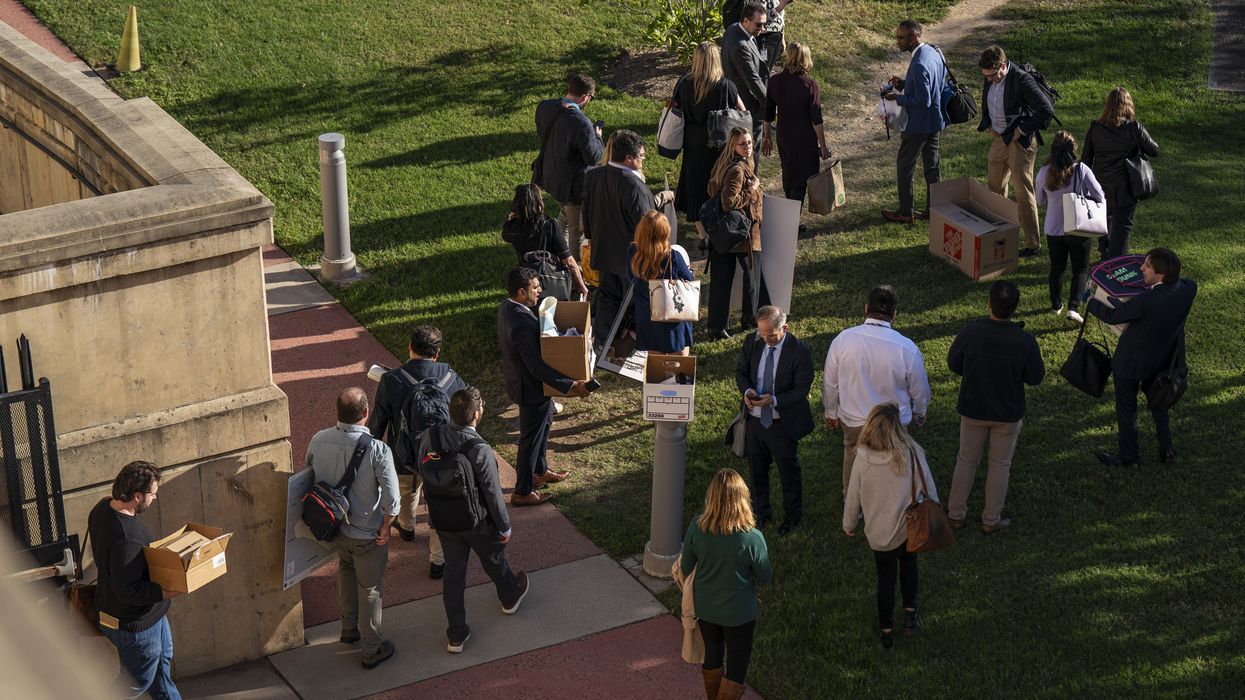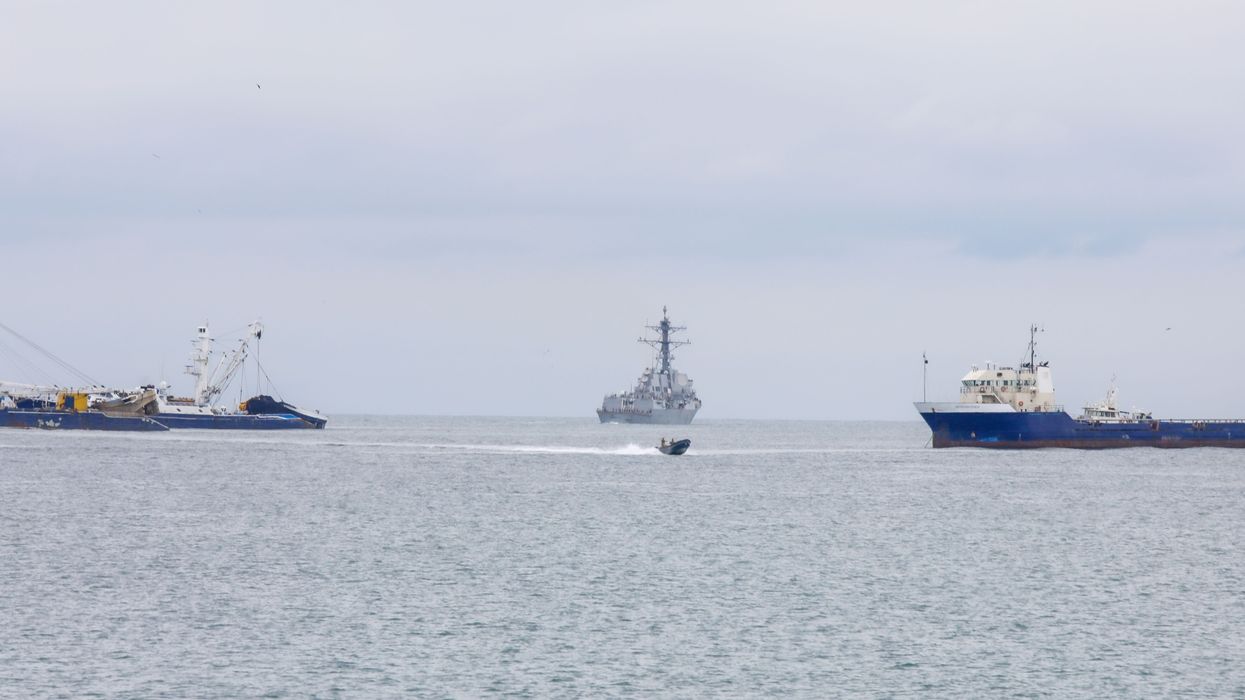February, 28 2012, 07:18am EDT

For Immediate Release
Contact:
Greg McNevin, Greenpeace International Communications, greg.mcnevin@greenpeace.org, +81 80 5416 6507 Yuki Sekimoto, Greenpeace Japan Communications, yuki.seikimoto@greenpeace.org, +81 80 5088 3048 Greenpeace International Press Desk Hotline, Amsterdam +31 20 7182470
Lessons from Fukushima Nuclear Disaster Report Shows Millions Remain at Risk
Greenpeace today released "Lessons from Fukushima", a new report which shows that it was not a natural disaster which led to the nuclear disaster at the Fukushima Daiichi plant on Japan's east coast, but the failures of the Japanese Government, regulators and the nuclear industry.
TOKYO
Greenpeace today released "Lessons from Fukushima", a new report which shows that it was not a natural disaster which led to the nuclear disaster at the Fukushima Daiichi plant on Japan's east coast, but the failures of the Japanese Government, regulators and the nuclear industry. The key conclusion to be drawn from the report is that this human-made nuclear disaster could be repeated at any nuclear plant in the world, putting millions at risk.
"While triggered by the tragic March 11th earthquake and tsunami, the Fukushima disaster was ultimately caused by the Japanese authorities choosing to ignore risks, and make business a higher priority than safety," said Jan Vande Putte, Greenpeace International nuclear campaigner. "This report shows that nuclear energy is inherently unsafe, and that governments are quick to approve reactors, but remain ill-equipped to deal with problems and protect people from nuclear disasters. This has not changed since the Fukushima disaster, and that is why millions of people continue to be exposed to nuclear risks."
Greenpeace commissioned Dr. David Boilley, a nuclear physicist with the French independent radiation laboratory ACRO; Dr. David McNeill, Japan correspondent for The Chronicle of Higher Education and other publications; and Arnie Gundersen, a nuclear engineer with Fairewinds Associates, to write "Lessons from Fukushima" (1). The report, peer reviewed by Dr. Helmut Hirsch, an expert in nuclear safety, reaches three important insights:
1) Japanese authorities and the operators of the Fukushima plant were entirely wrong in their assumptions about the risks of a serious accident. The real risks were known but downplayed and ignored.
2) Even though Japan is considered one of the best-prepared countries in the world for handling major disasters the reality of a large nuclear disaster proved to be far worse than what was planned for. Nuclear emergency and evacuation plans utterly failed to protect people.
3) Hundreds of thousands of people have been deeply affected by evacuations to escape radioactive contamination. They cannot rebuild their lives due to a lack of support and financial compensation. Japan is one of only three countries with a law making a nuclear operator liable for the full costs of a disaster. Yet, the liability law and compensation schemes are inadequate in Japan. Even a year after the disaster began, impacted people are essentially left on their own and Japanese taxpayers will end up paying much of the costs.
"This disaster was predictable and predicted, but happened because of the age-old story of cutting corners to protect profits over people," said Kazue Suzuki Greenpeace Japan Nuclear Campaigner. "The authorities are already recklessly pushing to restart reactors without learning anything from the Fukushima disaster and the people will once again be forced to pay the price of their government's mistakes."
"People should not be forced to live with the myth of nuclear safety and under the shadow of a nuclear disaster waiting to happen," said Vande Putte. "Nuclear power must be phased out and replaced with smart investments in energy efficiency and renewable power. This approach will create millions of sustainable jobs, improve energy independence, reduce greenhouse gas emissions, and will also ensure people will never again suffer radioactive fallout from a preventable disaster."
Greenpeace is urging the Japanese Government to not restart its nuclear power plants in favour of a strong push to energy efficiency and renewable power, and calling for a global phase out of nuclear power by 2035 (2).
Greenpeace is a global, independent campaigning organization that uses peaceful protest and creative communication to expose global environmental problems and promote solutions that are essential to a green and peaceful future.
+31 20 718 2000LATEST NEWS
In Trump Economy, Holiday Spending Plans Plummet and Layoffs Hit Highest Level Since Covid Pandemic
The grim data arrive as President Donald Trump is reportedly planning to "aggressively push back" on negative perceptions about his economy.
Dec 04, 2025
A new batch of data is offering more evidence that the US economy is in rough shape heading into the holidays.
The latest Economic Confidence Index released by Gallup on Thursday has found that Americans' confidence in the economy has fallen by seven points over the last month, and now stands at its lowest level in more than a year.
Overall, Gallup found that just 21% of Americans currently describe the economy as excellent or good, while 40% describe it as poor. The outlook for the near future also looks grim, as more than two-thirds of Americans surveyed said the economy is currently getting worse.
This deteriorating economic confidence is weighing on Americans' holiday shopping plans, as Gallup found that planned holiday spending expenditures have "plummeted" from just over $1,000 in October to $778 in November. The decline in spending expectations also occurred across all income groups, although it was particularly steep among low-income households, which slashed their estimated holiday spending by an average of $267.
Gallup noted that while it's common for shoppers to trim their spending plans the closer it gets to the holidays, the drop between October and November this year was the biggest it has ever recorded, even "surpassing the $185 drop seen during the 2008 global financial crisis."
The Gallup survey was not the only troubling economic data to drop on Thursday, as outplacement firm Challenger, Gray, and Christmas released its latest report showing that hiring in the US has slowed to its lowest level in the last 15 years, while layoffs now total their highest level since 2020, when the country was at the peak of the Covid-19 global pandemic.
The data on layoffs came just one day after global payroll processing firm ADP estimated that the US economy lost 32,000 jobs in November, with small businesses shouldering by far the most job losses.
President Donald Trump, who earlier this week dismissed concerns Americans might have about affordability as a "Democrat scam," has reportedly decided to hit the road in an effort to convince voters that they've never had it so good.
According to Axios, Trump next week will start touring the country to tout his administration's economic policies, and he is expected to "aggressively push back against criticism over the cost of everyday essentials—an issue that helped propel him to victory over Kamala Harris last year."
However, a new poll published by Politico on Thursday shows that Trump may have an uphill climb selling his economy even to his own voters.
Overall, the poll found that 37% of voters who backed Trump last year now say that the cost of living crisis is the worst they have experienced in their lifetimes, while only 24% of 2024 Trump voters say that the cost of living crisis at the moment is "not bad."
The poll also found that Trump's efforts to blame former President Joe Biden for the current state of the economy aren't flying, as 46% of voters say that Trump is most to blame for the current state of the economy, compared to 29% of voters who put the primary blame on Biden.
Keep ReadingShow Less
After NYT Sues Over Pentagon Policy, Press Advocates 'Urge Other News Outlets to Follow'
"The only way to put an end to the Trump administration's multipronged assault on press freedom is for every news outlet to fight back at every opportunity," said the head of the Freedom of the Press Foundation.
Dec 04, 2025
Press freedom advocates on Thursday welcomed the New York Times' lawsuit over the US Department of Defense's "flatly unconstitutional" press policy, filed on the heels of the first briefing for what critics call the "Pentagon Propaganda Corps."
The newspaper and Times reporter Julian E. Barnes, one of several journalists who refused to sign the policy earlier this year, are suing the DOD—which President Donald Trump has dubbed the Department of War—as well as Defense Secretary Pete Hegseth and the Pentagon's chief spokesperson, Sean Parnell, in the US District Court in Washington, D.C.
The plaintiffs are asking Judge Paul L. Friedman, an appointee of former President Bill Clinton, to strike down provisions of the Pentagon policy that violate their First and Fifth Amendment rights, and warn that "if allowed to stand, that policy will upend the longstanding and 'healthy adversarial tension between the government, which may seek to keep its secrets' and 'the press, which may endeavor to' report them... and will deprive the public of vital information about the United States military and its leadership."
The filing notably comes not only as the DOD celebrates that dozens of "independent journalists, bloggers, and social media influencers" who "are not associated with legacy media outlets, including print media such as newspapers and magazines, and broadcast media, such as cable television news," have joined the new Pentagon Press Corps in exchange for signing the controversial agreement, but also as Trump and Hegseth face mounting outrage over boat bombings that experts argue are "war crimes, murder, or both."
Charlie Stadtlander, a spokesperson for the newspaper, said in a statement that "the Times stands with fellow news organizations across digital, print, and broadcast media, including many conservative outlets, in strongly opposing this unprecedented policy."
The paper has hired a prominent First Amendment lawyer, Theodore J. Boutrous Jr. of Gibson Dunn. The Washington Post reported that "lawyers representing the Times said they discussed litigation with other news organizations but ultimately decided to proceed on their own. They said they would welcome other outlets filing their own lawsuits or amicus briefs in the Times' case."
While Parnell said in a statement that "we are aware of the New York Times lawsuit and look forward to addressing these arguments in court," journalists and media advocacy groups are already signaling support for the newspaper—which is also battling a $15 billion defamation suit refiled by the president in October.
Reporters Committee for Freedom of the Press vice president of policy Gabe Rottman said Thursday that "the Pentagon's press access policy is unlawful because it gives government officials unchecked power over who gets a credential and who doesn't, something the First Amendment prohibits."
"The public needs independent journalism and the reporters who deliver it back in the Pentagon at a time of heightened scrutiny of the department's actions," he asserted. "We look forward to lending our voice in support of this suit."
The Pentagon Press Association said it was "encouraged by the New York Times' effort to step up and defend press freedom," while White House Correspondents' Association president Weijia Jiang declared that the WHCA "stands firmly" with the newspaper and described the suit as "a necessary and vital step to ensure journalists can do their jobs."
Clayton Weimers, executive director for Reporters Without Borders USA, said that "it's great to see the New York Times continue to proactively defend press freedom in the courts as well as on their pages. We all know by now that capitulation to Donald Trump's authoritarian impulses never works out, but fighting back will."
"This is the logical next step after the mass refusal of journalists to sign Secretary of Defense Hegseth's loyalty pledge," Weimers added. "Journalists must be able to cover the government critically and freely."
Pointing to television companies' recent settlements with the president, Freedom of the Press Foundation executive director Trevor Timm said that "in an era where news networks seem to be caving to Trump's censorious tactics left and right, it's refreshing to see the New York Times leading by example and sticking up for the First Amendment in court."
"An attack on any journalist’s rights is an attack on all. And the only way to put an end to the Trump administration's multipronged assault on press freedom is for every news outlet to fight back at every opportunity," Timm continued. "We urge other news outlets to follow the Times' lead."
"These days, the government has countless platforms of its own to tell the public what it wants it to know. A free and independent press isn't needed for that," he noted. "The Constitution guarantees one anyway precisely because the public needs the information the government does not want it to know. The Pentagon's absurd access pledge has been an affront to the First Amendment since the first day they proposed it. And we look forward to a federal judge throwing it out with the trash, where it belongs."
Keep ReadingShow Less
UN Experts Say Those Ordering and Carrying Out US Boat Strikes Should Be 'Prosecuted for Homicide'
“US military attacks on alleged drug traffickers at sea," said two human rights experts, "are grave violations of the right to life and the international law of the sea."
Dec 04, 2025
Two United Nations rights experts warned that in numerous ways in recent weeks, the Trump administration's escalation toward Venezuela has violated international law—most recently when President Donald Trump said he had ordered the South American country's airspace closed following a military buildup in the Caribbean Sea.
But the two officials, independent expert on democratic and international order George Katrougalos and Ben Saul, the UN special rapporteur on protecting human rights while countering terrorism, reserved their strongest condemnation and warning to the US for the administration's repeated bombings of boats in the Caribbean and the Pacific, which have targeted at least 22 boats and killed 83 people since September as the White House has claimed without evidence it is combating drug traffickers.
The strikes, said Katrougalos and Saul, "are grave violations of the right to life and the international law of the sea. Those involved in ordering and carrying out these extrajudicial killings must be investigated and prosecuted for homicide.”
Human rights advocates have warned for months that the strikes are extrajudicial killings. Trump has claimed the US is in an "armed conflict" with drug cartels in Venezuela—even though the country is not significantly involved in drug trafficking—but Congress has not authorized any military action in the Caribbean.
Typically, the US has approached drug trafficking in the region as a criminal issue, with the Coast Guard and other agencies intercepting boats suspected of carrying illegal substances, arresting those on board, and ensuring they receive due process in accordance with the Constitution.
The Trump administration instead has bombed the boats, with the first operation on September 2 recently the subject of particular concern due to reports that Defense Secretary Pete Hegseth issued an order for military officers to "kill everybody" on board a vessel, leading a commander to direct a second "double-tap" strike to kill two survivors of the initial blast.
Hegseth and Trump have sought to shift responsibility for the second strike onto Adm. Frank "Mitch" Bradley, the commander who oversaw the attack under Hegseth's orders. Bradley was scheduled to brief lawmakers Thursday on the incident.
The White House has maintained Bradley had the authority to kill the survivors of the strike and to carry out all the other bombings of boats, even as reporting on the identities of the victims has shown the US has killed civilians including an out-of-work bus driver and a fisherman, and the family of one Colombian man killed in a strike filed a formal complaint accusing Hegseth himself of murder.
The UN experts suggested that everyone involved in ordering the nearly two dozen boat strikes, from Trump and Hegseth to any of the service members who have helped carry out the operations, should be investigated for alleged murder.
After Hegseth defended the September 2 strike earlier this week, Saul emphasized in a social media post that contrary to the defense secretary's rhetoric about how the boat attacks are "protecting" Americans, he is carrying out "state murder of civilians in peacetime, like executing alleged drug traffickers on the streets of New York or DC."
As Common Dreams reported last month, a top military lawyer advised the White House against beginning the boat bombings weeks before the September 2 attack, saying they could expose service members involved in the strikes to legal challenges.
Katrougalos and Saul urged the administration to "refrain from actions that could further aggravate the situation and ensure that any measures taken fully comply with the UN Charter, the Chicago Convention, and relevant rules of customary international law."
They also emphasized that Trump had no authority to declare that Venezuela's airspace was closed last week—an action that many experts feared could portend imminent US strikes in the South American country.
“International law is clear: States have complete and exclusive sovereignty over the airspace above their territory. Any measures that seek to regulate, restrict, or ‘close’ another state’s airspace are in blatant violation of the Chicago Convention,” said the experts. “Unilateral measures that interfere with a state’s territorial domain, including its airspace, risk fully undermining the stability of the region and are seriously undermining Venezuela’s economy."
Saul and Katrougalos further called on the White House not to repeat "the long history of external interventions in Latin America."
“Respect for sovereignty, nonintervention, and the peaceful settlement of disputes," they said, "are essential to preserving international stability and preventing further deterioration of the situation.”
Keep ReadingShow Less
Most Popular


